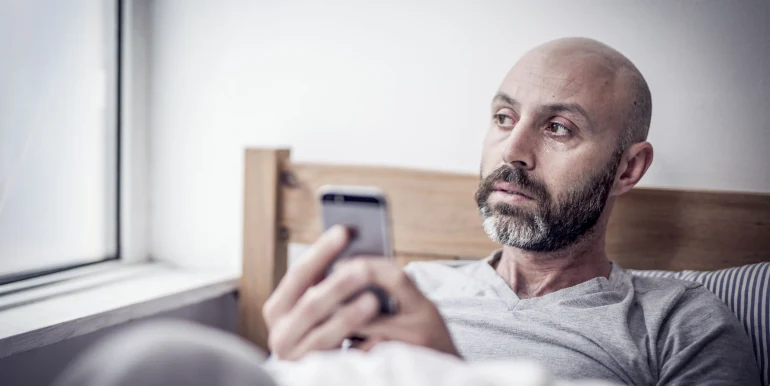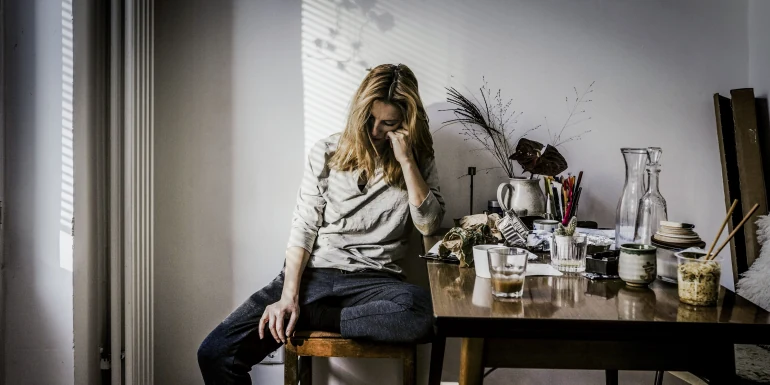
Depression – what to do?
Depression is extremely debilitating and has far-reaching consequences. The sooner it is treated, the better. These therapies and points of contact can help.
Depression is the most common mental illness. A wide range of therapies that use different treatment methods is available. Here are the key points:
- Good treatment should be carried out by specialist and include therapy.
- The earlier depression is treated, the easier and more successful the therapy.
- Early treatment reduces the risk for recurring episodes (recurrent depression).
- It is also important to explain the illness to relatives and include them in the process.
Does every type of depression have to be treated?
Under certain circumstances, mild depression goes away by itself. However, without treatment, the illness lasts longer, can recur again at a later point in time or can become chronic. The decisive factor is the level of suffering: how much does the illness impact the affected person’s work, everyday life and free time? Professional help for depression is required when the life of the affected person and their relatives is severely impacted or if they have suicidal thoughts.
Do you think that you might be depressed? Our self-test can help you to get a better idea of the situation.
Professional help for depression
General practitioner
- The first point of contact for suspected depression: for diagnostic consultation, physical examination
- Makes a diagnosis, presents treatment options
- Treats mild depression, prescribes psychotherapy when required
Psychiatrist
- A specialist for mental illnesses with expert knowledge of the origin, diagnosis and treatment of depression
- Treatment with medication and psychotherapy
Psychotherapist
- Psychologist with therapeutic training
- In psychotherapy, patients learn new strategies for managing their life (e.g. behaviour therapy)
- Cannot prescribe medication
Psychiatric clinic
- In the case of severe depression with severe symptoms, such as risk of suicide
- Treated with medication and psychotherapy, range of therapies
- Length of stay is generally four to eight weeks
- Outpatient therapy also possible (day/week stays)
How can depression be treated?
Depression is primarily treated using psychotherapy. Specialists may recommend other measures to treat it, such as medication or exercise.
Complementary medicine such as herbal medicine and relaxation techniques for dealing with stress, such as mindfulness training, can also help.
Many people affected by depression also find physical and creative forms of therapy, such as art, creative, movement and music therapy, helpful. Talk to your doctor about your treatment options. Our health consultation team will be happy to help you. Please note that not all types of therapy are covered by your insurance.
Our health consultation advisors will show you how you can recognise, prevent and treat depression. We’ll also help you find a recognised therapist.
Psychotherapy
Psychotherapy treats mental problems that disrupt a person’s thoughts, feelings and actions. It can be carried out either as inpatient or outpatient treatment at a clinic, individually or in a group.
There are various types of psychotherapy. Every type of therapy is based on its own theory and has different treatment approaches. Behaviour therapy is one of the most common and researched psychotherapies. It involves finding new strategies for solving problems and practising beneficial behaviours. Other types of therapy include psychodynamic psychotherapy and systemic therapy.
Who pays for psychotherapy?
Previously, the only psychotherapy covered by basic insurance was medical or delegated psychotherapy. Basic insurance was extended as of 1 July 2022 to cover the costs of independent psychotherapists too, provided the statutory conditions for this are met. 30 sessions of this non-medical psychotherapy are provided for. A medical prescription is required for this. This is valid for a maximum of 15 sessions. Delegated psychotherapy will continue to be covered for ongoing treatments within the scope currently provided for until the end of 2022.
We would be happy to check any potential payment of costs under TOP or COMPLETA supplementary insurance if the psychotherapist or service content do not meet the requirements of basic insurance.
Antidepressants
In cases of moderate to severe depression, specialists may also prescribe antidepressants. There are many different types of antidepressant, each of which affects the brain differently. Depending on the compound, they can have a motivating, mood-lifting, anxiolytic or calming effect. People react differently to the ways the various antidepressants work. They may also experience side effects such as difficulty sleeping, nausea or headaches. You should therefore discuss your options with your doctor.
Herbal antidepressants
The mood-lifting St. John’s wort is used to treat mild to moderate depression. Similar to chemical antidepressants, it balances the transmitters in the central nervous system. St. John’s wort can have side-effects with other medications, such as the contraceptive pill, and it cannot be combined with other antidepressants. Consult your doctor before taking St. John’s wort.
Light therapy
Light therapy can help with winter depression. Seasonal depression occurs in autumn and winter when the days are shorter and we get less sunlight. Because our bodies produce more of the sleep hormone melatonin when it is dark, we feel more tired during the day. Daylight increases the production of the neurotransmitter serotonin and ensures that the body produces less melatonin.
When daily walks in the fresh air are no longer enough, light therapy can be a good option. There are special daylight therapy lamps that have at least 10,000 lux. Light therapy involves looking at a light every morning for at least 30 minutes during the winter.
This depends on the symptoms, how the depression progresses and the individual situation of the person affected. Keep aware of yourself and others – and if you suspect depression, get help. Discuss any symptoms with your doctor.
Counselling services
Self-help groups (also for relatives)

The expert provided the editorial team with advice and input for this article. Melissa Biedermann (psychologist and life coach) works in the Helsana Health Consultation Service. She supports customers on questions to do with the mental health and mindfulness.


Newsletter
Find out more about current health issues every month and get all the information you need about our attractive offers from all Helsana Group companies * delivered by e-mail to read whenever it suits you. Our newsletter is free of charge and you can sign up here:
We did not receive your information. Please try again later.
* The Helsana Group comprises Helsana Insurance Company Ltd, Helsana Supplementary Insurances Ltd and Helsana Accidents Ltd.